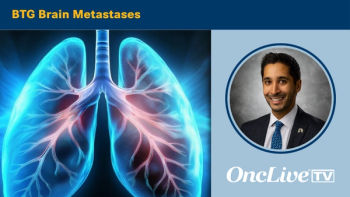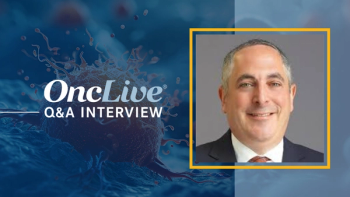
Emerging Vaccines in Glioblastoma
Transcript:Maciej Mrugala, MD, PhD, MPH: As we were discussing before, vaccine approaches to brain tumors have been in development now for quite a few years. One of the vaccines that has been really thoroughly tested is a vaccine against EGFR variant III mutation that occurs in about 25% to 30% of glioblastomas. This particular vaccine, called rindopepimut, is a peptide vaccine engineered to trigger immune response to the EGFR variant mutation that I mentioned before. This vaccine was tested in recurrent disease and also in newly-diagnosed glioblastoma. There was a large study called ACT IV. It was a phase III double-blind, placebo-controlled trial that tested the utilization of the vaccine in newly-diagnosed patients in combination with standard therapy—so, radiation and temozolomide. These were very much anticipated results. We all felt that, based on prior experience with this vaccine, the study would be positive, meaning that patients receiving the vaccine would do significantly better. To our surprise, the study, unfortunately, was negative, indicating that patients receiving the vaccine actually did not derive a survival benefit from it. And that was, again, in newly-diagnosed patients. So, that was a huge disappointment. I’ve been working with this vaccine and the sponsor of the study since 2007, so I have a long history of working with it, and I’ve had patients receiving the vaccine who have done very well. Of course, in my mind, without knowing the results of the study, I felt that we’re going to have a vaccine for brain tumors that’s going to be approved. But it looks like it wasn’t meant to be.
But, thankfully, I think this agent is not, so to speak, dead. It has been tested in recurrent glioblastoma, in the ReACT study, where it was combined with bevacizumab, the monoclonal antibody, against VEGF (vascular endothelial growth factor). And, in this study, contrary to the newly-diagnosed patients, patients receiving a combination of bevacizumab and rindopepimut actually showed long-term responses to treatment. The drug was very well tolerated. The data are still being analyzed, but I do hope that, potentially, if the study happens to be positive, rindopepimut might find its niche in the recurrent disease setting, especially in combination with bevacizumab.
So, I think we need to wait for the final analysis, but I am really hopeful. I like the product a lot. It’s associated with minimal toxicity. The patients get the vaccine initially twice, the 2 priming doses every 2 weeks, and then they go on to receive a monthly dose. It’s very well tolerated with no major side effects. I think it will be really great news for the oncology community and for GBM patients, if the recurrent disease study is positive, to have this available as an option because in recurrent disease, we do not have good options for patients, and the survivals are not great. We definitely need something that would shift the balance in favor of longer survival, and I’m hoping that this vaccine would be the answer.
Daniela Bota, MD: It is a great time for the development of immunotherapies in cancer. Immunotherapies are making a difference in the life of patients with lung cancer, melanoma, and other malignancies. At this time, we are trying to replicate those successes in the treatment of glioblastoma. The most exciting studies, for me, are the the phase III potential registration studies—because that means that they are closer and closer to being able to offer them to the patients. I’m an investigator on the ICT-107 vaccine study. And this study is very important for us in California, as it’s one of the first clinical trials in glioblastoma that’s also supported by the California Stem Cell Institute. The study is supposed to target the glioblastoma stem cells. In order to eliminate the glioblastoma, you have to eliminate the most active cells of the tumor, which are the stem cells. So, it’s a very interesting, very wonderful idea.
The data from the preliminary studies that were done in the past were very promising for a special subtype of the patients: the patients that have the HLA-82 haplotype in the blood. This is something that is tested all the time for transplant. It just tells you what the category of the blood group, in a way, is for patients. But, for that group of patients in the previous studies, we saw a great improvement in overall survival with ICT 107. So, we are very excited to have participated in the latest trial. We are very hopeful for the study’s success, and we’ll see what the results are, hopefully by the next year, at the Society of Neuro-Oncology meeting.
DCVax has been in clinical trials now for a few years, and we are still following patients that are involved in the study. I am an investigator on the DCVax studies, too. We have momentarily stopped the recruitment while the data are getting processed. The previous studies with DCVax were very promising for both vaccines that we talked about. We are talking about immune treatments that will target special subgroups of patients, and we are getting closer and closer to personalized medicine. While the ICT-107 targets patients that have a special blood haplotype. The DCVax goes in a different direction where the patient’s tumor is collected at the time of the surgery, and it’s processed to generate a maximum number of antigens. And then, the antigens are introduced to the patient’s immune cells, the dendritic cells, which are then re-injected in the patient’s circulation. So, every batch of DCVax is specific to the patient from which the tumor came, which gets us to the level of trying to really treat every tumor as one tumor and not as a part of a much larger disease. I’m very hopeful that we’re going to learn a lot from the DCVax results, and I hope we’re going to be talking about that real soon.
Transcript Edited for Clarity






































